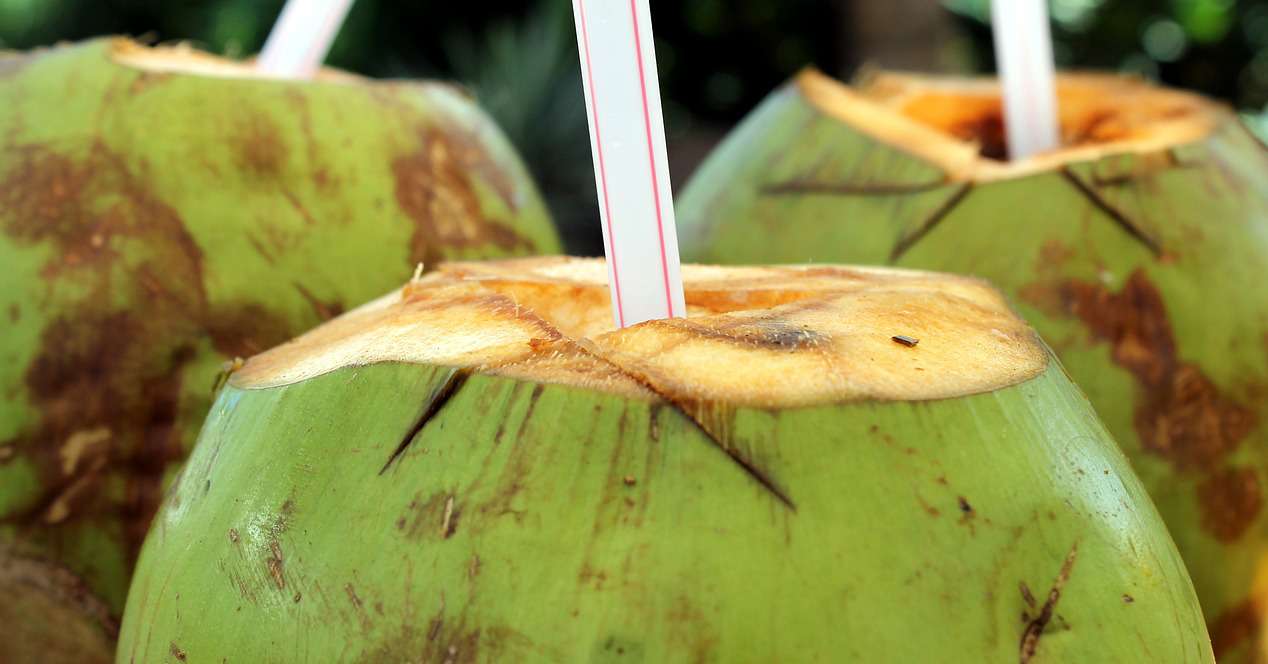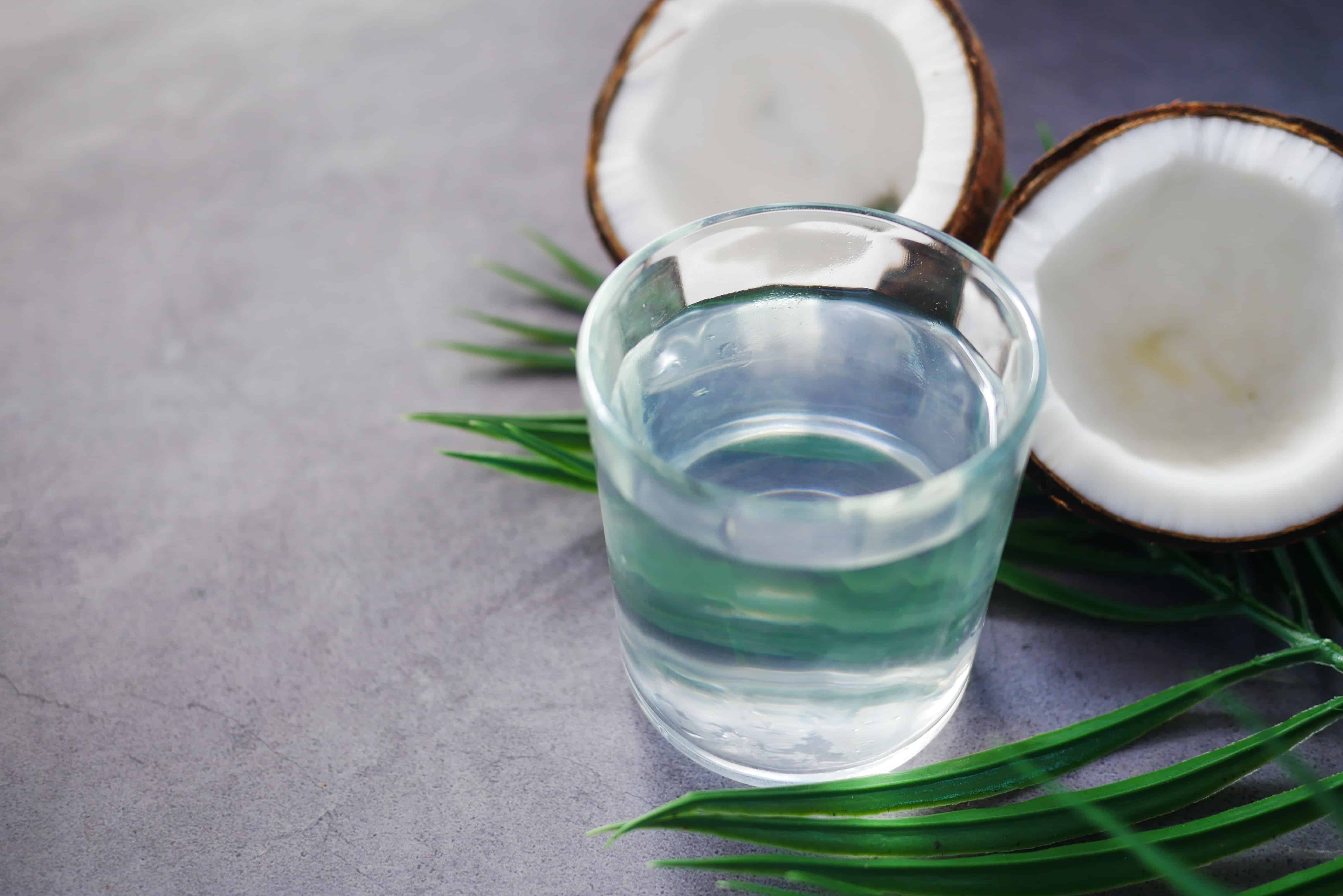
Coconut water is the liquid that comes out when you open a coconut. Older coconuts (those that are brown and hairy) generally provide the best coconut milk, which is made from the meat of the coconut. Younger green coconuts produce better coconut water.
This drink has a sweet and salty taste that can be divisive, but it provides fewer calories than most fruit juices. It also provides vitamin C, carbohydrates, and electrolytes that may be helpful for post-exercise recovery.
What is coconut water?
This extracted beverage results from immature coconuts, and is packed with nutrients and therapeutic properties. This water has been used as a natural remedy for years, but today it has become more relevant among people who take care of themselves and follow a healthy lifestyle.
Ideally eat it straight from the coconut to make sure that it is 100% natural and that we will absorb all the nutrients and benefits. As you will have seen, it does not come from the coconut that we normally consume (the typical brown one). Coconut water is within the green coconuts (immature), just the one that when ripe we eat in summer. The ideal is to extract their water when they are about 6/7 months old, which is just at the halfway point of their maturity.
Of course, you should not confuse water with coconut milk, they are totally different and have different properties. Coconut water contains mostly a 94% water, and a small amount of minerals, vitamins, and healthy fats.
Nutrients
A cup of coconut water (245 grams) contains:
- Energy: 45,6 calories
- Protein: 1,7 grams
- Fat: 0 grams
- Sodium: 64 mg
- Carbohydrates: 10,4 grams
- Fiber: 0 grams
- Sugars: 9,6 grams
- Potassium: 17% of the recommended daily allowance
- Manganese: 17%
- Magnesium: 15%
- Sodium: 11%
- Vitamin C: 10%
- Vitamin B2: 8%
- Calcium: 6%
A one-cup serving of coconut water provides about 10 grams of carbs; most of it (about 9 grams) is natural sugar. Some brands of coconut water are sweetened with added sugars, so check labels carefully if you want to limit sugar. Coconut water contains a small amount of protein; the amount may vary by brand.
However, it is an excellent source of vitamin C, with 24 mg per one cup serving. That's 32% of the RDA for women and 27% for men, based on a 2000 calorie per day diet. Coconut water also contains the B vitamin thiamine (about 8% of the RDA). The large amount of potassium it has is perfect for regulating blood pressure and preventing any circulatory problem (strokes or heart attacks). Logically, it is not a miracle drink and it is not going to try to cure any health problem, it will only improve your functioning or reduce the chances of getting sick.
One cup of 100% coconut water provides 45 calories, 75% of which are from carbohydrates, 15% from protein, and 10% from fat. Coconut water is a low calorie drink.
It is highly recommended for athletes, since its content in electrolytes (potassium, magnesium, sodium, calcium and phosphorus) helps replace micronutrients lost through sweat while we've been training. In addition, in a study it was confirmed that drinking coconut water achieved effects very similar to sports drinks in terms of rehydration.
As if that were not enough, it prevents diabetes, contains antioxidants, increases the body's defenses, delays cell aging, regulates blood pressure, improves fluid retention and prevents digestive problems. Of course, the fact that it is a healthy drink does not imply that we have to abuse its consumption. All excess ends up being harmful to us.

Advantages
In recent years, coconut water has become the hot drink. In addition to being naturally sweet and hydrating, coconut water is packed with several important nutrients, including minerals that many people don't get enough of.
Antioxidant properties
Free radicals are unstable molecules produced in your cells during metabolism. Production increases in response to stress or injury. When there are too many free radicals, the body enters a state of oxidative stress, which can damage cells and increase the risk of disease.
One study highlighted the benefits of coconut water extract in a high-fat diet. Coconut water not only helped lower cholesterol markers, but also showed antioxidant power. While these studies are interesting, it is important to note that no studies involving humans and the antioxidant power of coconut water have been conducted to date, and each of the animal studies used different dosages and parameters.
Sugar level control
Research has shown that this drink can lower blood sugar levels and improve other markers of health in animals with diabetes.
In one study, diabetic rodents that were treated with coconut water maintained better blood sugar levels than the control group. The same study also found that rats given coconut water had lower hemoglobin A1c levels, indicating better long-term blood sugar control.
However, another added benefit of coconut water for blood sugar is that it is a good source of magnesium, which can increase insulin sensitivity and lower blood sugar levels in people with type 2 diabetes and prediabetes. .
Prevent kidney stones
Drinking enough fluids is important for the prevention of kidney stones. Although plain water is a good option, two small studies suggest that coconut water might be even better.
Kidney stones are created when calcium, oxalate, and other compounds combine to form crystals in the urine. These crystals can form small stones. Although some people are more susceptible than others, kidney stones affect approximately 12% of the world's population.
promotes recovery
Coconut water may be the perfect drink to restore hydration and replenish electrolytes lost during exercise. Electrolytes are minerals that perform several important roles in your body, including maintaining proper fluid balance. Some vital electrolytes include potassium, magnesium, sodium, and calcium.
Because coconut water contains electrolytes such as potassium and magnesium, several studies have found that it may be more beneficial than water for post-exercise rehydration. In fact, one small study found that this drink improved exercise capacity better than water or a sports drink during a very hot day.
hydration source
Natural coconut water is slightly sweet with a subtle nutty flavor. It is also quite low in calories and carbs. It's freshest straight from the fruit, but if you can't fill your fridge with fresh coconuts, there are many brands of coconut water in supermarkets these days.
We'll just make sure to read the ingredients to verify that you're getting 100% coconut water. Some bottled brands may contain added sugar or flavoring agents. You can use this tropical liquid as a smoothie base, chia seed pudding, vinaigrette dressing, or substitute for water when you want a bit of natural sweetness.

efectos secundarios
Although potassium is an essential mineral, excessive consumption can lead to hyperkalemia (an excess of potassium in the blood). Since this drink contains potassium, drinking large amounts could cause this problem. This is unlikely to happen to most people, but those who have chronic kidney disease or take medications, including ACE inhibitors, should be careful.
It also has a high content of FODMAP, a group of carbohydrates that can cause or worsen digestive symptoms in people with irritable bowel syndrome (IBS). People on a low FODMAP diet may need to limit or avoid it if it causes symptoms.
electrolyte imbalance
Coconut water's high potassium content is one reason it makes a wonderful drink. But then the same reason can make it fatal if consumed in excess.
In one specific case, a man had spent an entire day playing tennis in 32-degree weather. It just so happened that he consumed a whopping 2 liters of coconut water, which resulted in a condition called hyperkalemia, which eventually led to a serious condition. Hyperkalemia causes weakness and dizziness, and within minutes the victim may lose consciousness.
Laxative effect
Excessive consumption can also be dangerous. Drinking too much can have laxative effects on the digestive system. Since coconut water is a natural laxative, it may not be suitable for some people who have problems with their bowel movements. Therefore, care should be taken before consuming a large amount.
Another disadvantage is that properties diuretics. This means that much of the consumption may require us to take a break and visit the bathroom several times. Although a small amount of coconut water has moisturizing properties, excessive consumption can be unhealthy.